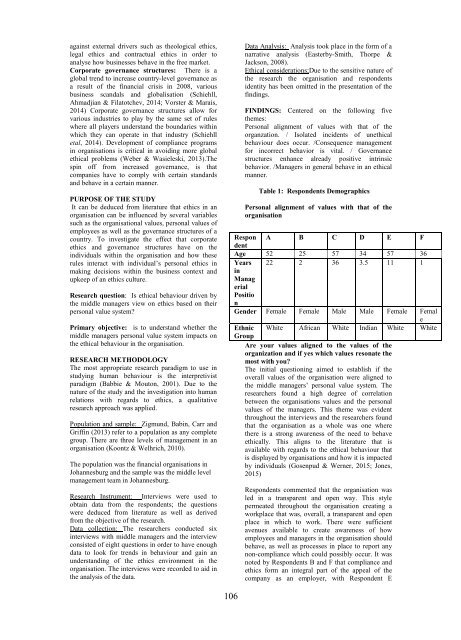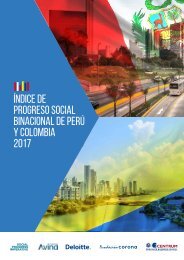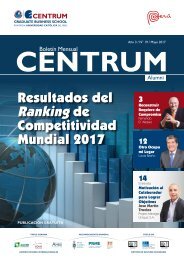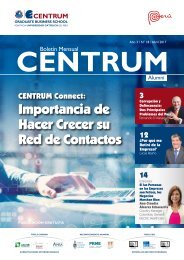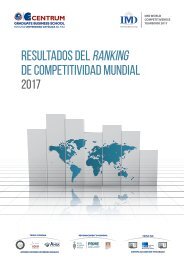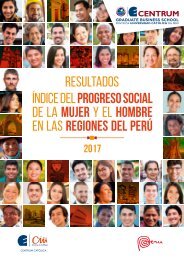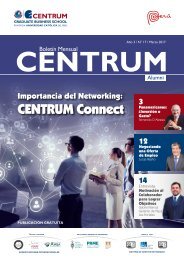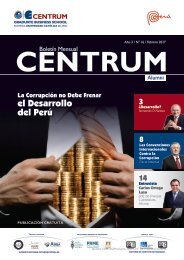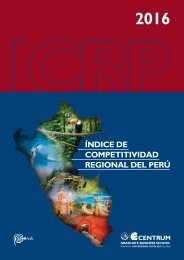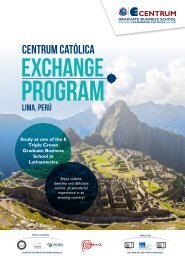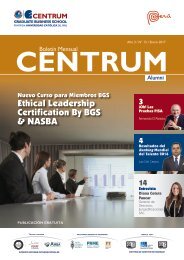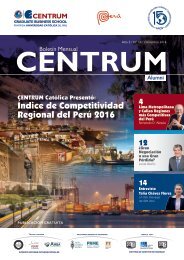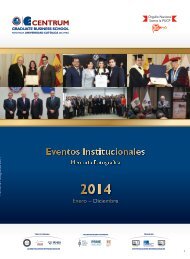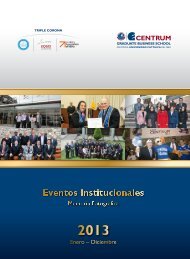Pan-Pacific Conference XXXIV. Designing New Business Models in Developing Economies
This publication represents the Proceedings of the 34th Annual Pan-Pacific Conference being held in Lima, Peru May 29-31, 2017. The Pan-Pacific Conference has served as an important forum for the exchange of ideas and information for promoting understanding and cooperation among the peoples of the world since 1984. Last year, we had a memorable conference in Miri, Malaysia, in cooperation with Curtin University Sarawak, under the theme of “Building a Smart Society through Innovation and Co-creation.” Professor Pauline Ho served as Chair of the Local Organizing Committee, with strong leadership support of Pro Vice-Chancellor Professor Jim Mienczakowski and Dean Jonathan Winterton.
This publication represents the Proceedings of the 34th Annual Pan-Pacific Conference being held in Lima, Peru May 29-31, 2017. The Pan-Pacific Conference has served as an important forum for the exchange of ideas and information for promoting understanding and cooperation among the peoples of the world since 1984. Last year, we had a memorable conference in Miri, Malaysia, in cooperation with Curtin University Sarawak, under the theme of “Building a Smart Society through Innovation and Co-creation.” Professor Pauline Ho served as Chair of the Local Organizing Committee, with strong leadership support of Pro Vice-Chancellor Professor Jim Mienczakowski and Dean Jonathan Winterton.
You also want an ePaper? Increase the reach of your titles
YUMPU automatically turns print PDFs into web optimized ePapers that Google loves.
aga<strong>in</strong>st external drivers such as theological ethics,<br />
legal ethics and contractual ethics <strong>in</strong> order to<br />
analyse how bus<strong>in</strong>esses behave <strong>in</strong> the free market.<br />
Corporate governance structures: There is a<br />
global trend to <strong>in</strong>crease country-level governance as<br />
a result of the f<strong>in</strong>ancial crisis <strong>in</strong> 2008, various<br />
bus<strong>in</strong>ess scandals and globalisation (Schiehll,<br />
Ahmadjian & Filatotchev, 2014; Vorster & Marais,<br />
2014) Corporate governance structures allow for<br />
various <strong>in</strong>dustries to play by the same set of rules<br />
where all players understand the boundaries with<strong>in</strong><br />
which they can operate <strong>in</strong> that <strong>in</strong>dustry (Schiehll<br />
etal, 2014). Development of compliance programs<br />
<strong>in</strong> organisations is critical <strong>in</strong> avoid<strong>in</strong>g more global<br />
ethical problems (Weber & Wasieleski, 2013).The<br />
sp<strong>in</strong> off from <strong>in</strong>creased governance, is that<br />
companies have to comply with certa<strong>in</strong> standards<br />
and behave <strong>in</strong> a certa<strong>in</strong> manner.<br />
PURPOSE OF THE STUDY<br />
It can be deduced from literature that ethics <strong>in</strong> an<br />
organisation can be <strong>in</strong>fluenced by several variables<br />
such as the organisational values, personal values of<br />
employees as well as the governance structures of a<br />
country. To <strong>in</strong>vestigate the effect that corporate<br />
ethics and governance structures have on the<br />
<strong>in</strong>dividuals with<strong>in</strong> the organisation and how these<br />
rules <strong>in</strong>teract with <strong>in</strong>dividual’s personal ethics <strong>in</strong><br />
mak<strong>in</strong>g decisions with<strong>in</strong> the bus<strong>in</strong>ess context and<br />
upkeep of an ethics culture.<br />
Research question: Is ethical behaviour driven by<br />
the middle managers view on ethics based on their<br />
personal value system?<br />
Primary objective: is to understand whether the<br />
middle managers personal value system impacts on<br />
the ethical behaviour <strong>in</strong> the organisation.<br />
RESEARCH METHODOLOGY<br />
The most appropriate research paradigm to use <strong>in</strong><br />
study<strong>in</strong>g human behaviour is the <strong>in</strong>terpretivist<br />
paradigm (Babbie & Mouton, 2001). Due to the<br />
nature of the study and the <strong>in</strong>vestigation <strong>in</strong>to human<br />
relations with regards to ethics, a qualitative<br />
research approach was applied.<br />
Population and sample: Zigmund, Bab<strong>in</strong>, Carr and<br />
Griff<strong>in</strong> (2013) refer to a population as any complete<br />
group. There are three levels of management <strong>in</strong> an<br />
organisation (Koontz & Welhrich, 2010).<br />
The population was the f<strong>in</strong>ancial organisations <strong>in</strong><br />
Johannesburg and the sample was the middle level<br />
management team <strong>in</strong> Johannesburg.<br />
Research Instrument: Interviews were used to<br />
obta<strong>in</strong> data from the respondents; the questions<br />
were deduced from literature as well as derived<br />
from the objective of the research.<br />
Data collection: The researchers conducted six<br />
<strong>in</strong>terviews with middle managers and the <strong>in</strong>terview<br />
consisted of eight questions <strong>in</strong> order to have enough<br />
data to look for trends <strong>in</strong> behaviour and ga<strong>in</strong> an<br />
understand<strong>in</strong>g of the ethics environment <strong>in</strong> the<br />
organisation. The <strong>in</strong>terviews were recorded to aid <strong>in</strong><br />
the analysis of the data.<br />
Data Analysis: Analysis took place <strong>in</strong> the form of a<br />
narrative analysis (Easterby-Smith, Thorpe &<br />
Jackson, 2008).<br />
Ethical considerations;Due to the sensitive nature of<br />
the research the organisation and respondents<br />
identity has been omitted <strong>in</strong> the presentation of the<br />
f<strong>in</strong>d<strong>in</strong>gs.<br />
FINDINGS: Centered on the follow<strong>in</strong>g five<br />
themes:<br />
Personal alignment of values with that of the<br />
organzation. / Isolated <strong>in</strong>cidents of unethical<br />
behaviour does occur. /Consequence management<br />
for <strong>in</strong>correct behavior is vital. / Governance<br />
structures enhance already positive <strong>in</strong>tr<strong>in</strong>sic<br />
behavior. /Managers <strong>in</strong> general behave <strong>in</strong> an ethical<br />
manner.<br />
Table 1: Respondents Demographics<br />
Personal alignment of values with that of the<br />
organisation<br />
Respon A B C D E F<br />
dent<br />
Age 52 25 57 34 57 36<br />
Years 22 2 36 3.5 11 1<br />
<strong>in</strong><br />
Manag<br />
erial<br />
Positio<br />
n<br />
Gender Female Female Male Male Female Femal<br />
e<br />
Ethnic White African White Indian White White<br />
Group<br />
Are your values aligned to the values of the<br />
organization and if yes which values resonate the<br />
most with you?<br />
The <strong>in</strong>itial question<strong>in</strong>g aimed to establish if the<br />
overall values of the organisation were aligned to<br />
the middle managers’ personal value system. The<br />
researchers found a high degree of correlation<br />
between the organisations values and the personal<br />
values of the managers. This theme was evident<br />
throughout the <strong>in</strong>terviews and the researchers found<br />
that the organisation as a whole was one where<br />
there is a strong awareness of the need to behave<br />
ethically. This aligns to the literature that is<br />
available with regards to the ethical behaviour that<br />
is displayed by organisations and how it is impacted<br />
by <strong>in</strong>dividuals (Gosenpud & Werner, 2015; Jones,<br />
2015)<br />
Respondents commented that the organisation was<br />
led <strong>in</strong> a transparent and open way. This style<br />
permeated throughout the organisation creat<strong>in</strong>g a<br />
workplace that was, overall, a transparent and open<br />
place <strong>in</strong> which to work. There were sufficient<br />
avenues available to create awareness of how<br />
employees and managers <strong>in</strong> the organisation should<br />
behave, as well as processes <strong>in</strong> place to report any<br />
non-compliance which could possibly occur. It was<br />
noted by Respondents B and F that compliance and<br />
ethics form an <strong>in</strong>tegral part of the appeal of the<br />
company as an employer, with Respondent E<br />
106


